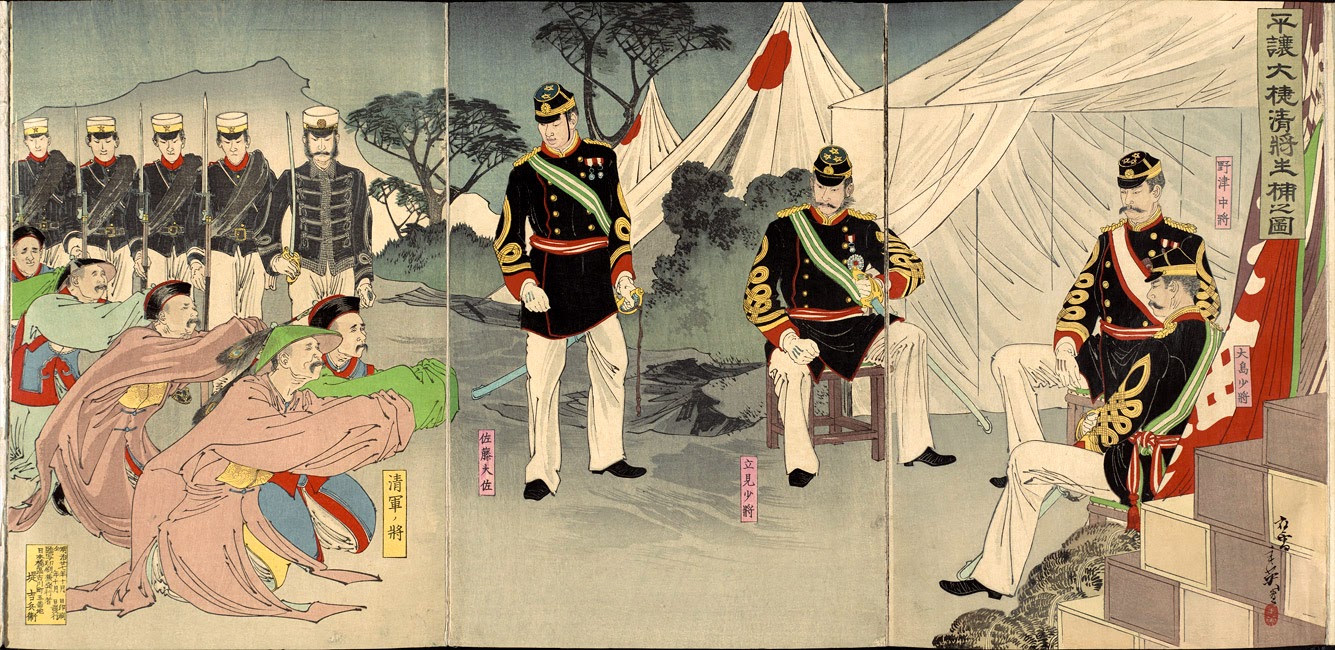Today, I was watching a program on CCTV (I try to keep up with what the other side is saying occasionally) and the topic was the First Sino-Japanese War (Japan-Qing War
日清戦争) as 2014 is the 120th anniversary of the start of the conflict. As is to be expected, however, the CCTV commentators did not simply use history as a tool to learn from past mistakes and successes but rather prefer to use history as a weapon for the benefit of the present-day communist regime. The spoke about the war as one in a series of Japanese “invasions” of China and that should be dealt with first. For those unfamiliar with the facts of the matter, the Empire of Japan did not start the trouble with China. It started in Korea which Japan wanted to see independent of China which had dominated Korea for centuries as a vassal state. There was a series of incidents which led to the conflict, all of which involved attacks against Japan. In 1892 there was a rebellion by Korean troops and peasants because of a famine that resulted in an attack on the Japanese legation and it was only thanks to a waiting British warship that the legation staff were able to escape alive. In 1884 a Chinese-backed coup in Korea saw the Japanese legation burned to the ground. Then, in 1886, Chinese naval forces landed in Nagasaki and went on a rampage, looting property, killing police and molesting Japanese women and children. In 1889 the Korean government cut off soybean exports to Japan, causing much hardship and in 1894 there was the assassination of a pro-Japanese Korean activist in China (by pro-Chinese Koreans). Later that summer, China sent troops in Korea and Japan responded by sending a force of its own. Inevitably, the two sides clashed and the war was started.

Obviously, any fair-minded person can see that this war was not a case of Japan “invading” China and I say that as someone who is a big supporter of the late Qing Empire. The Japanese had been attacked numerous times and finally took action to protect the Japanese people and Japanese interests in Korea and send the message to China that the Empire of Japan would not be bullied. The way it worked out, as most know, is that China was disastrously defeated which shocked the rest of the world as no one expected that a small country like Japan, which only recently began interacting with the rest of the world, would be able to defeat the traditional regional power of China. From that point until the end of World War II, the Empire of Japan was the new regional super-power of East Asia. There are a number of lessons China could draw from this defeat and for the most part, the country did so long ago. Things like the need for a unified military command, a centralized authority, problems with discipline, training and corruption were all identified and China has known about this and tried to remedy these problems for a long time. The panel did make mention of the fact that corruption in the army is still a concern in China today, but that was quickly brushed aside because, as the panelists said, they did not want to tarnish the “glorious” reputation of the Chinese People’s Liberation Army. I suppose by “glorious” they mean slaughtering peaceful Tibetan Buddhists or defenseless students protesting for basic freedom because other than that, the PLA does not have much of a record of success behind it.

This panel sat there and claimed that the massive military buildup of China was good for everyone because it would contribute to the “peace and stability” of East Asia while at the same time, these same men claimed that even the most modest steps to improve self-defense by Japan were acts of unwarranted “aggression”. They also brought up the expected line about China, Russia and South Korea needing to work together to preserve the post-World War II “world order” by which they mean keeping Japan weak, isolated and submissive. That is, of course, how the Red Chinese use history as a weapon rather than an educational tool. They will always invoke World War II to try to maintain anti-Japanese hostility and to cast themselves in a positive light. However, if anyone cared to note the facts, they would remember that neither the Red Chinese, Russian Federation or Republic of Korea even existed at the time of World War II and the Chinese communists certainly played no part in defeating Japan. They barely took part in the fighting at all, simply being content to sit back and allow the Kuomintang to carry the burden while they waited to pounce when it was over.

It is clear that Communist China will never relent in their hatred of Japan and their military build-up, even while having enough to overpower every continental neighbor, is proof of their hostile intentions. The pro-peace and passivity crowd in Japan need to realize that the time is near which will decide whether Japan will be an independent nation or a servant of Red China. If Japan wishes to remain an independent country, it is necessary to take defense more seriously and stop allowing Red China to control the narrative and define Japan in the eyes of the world. Decisive action must be taken quickly before it is too late.





No comments:
Post a Comment